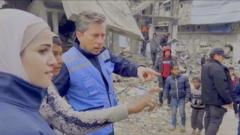
Gaza Facing Allegations of Forced Starvation: A Deep Dive into the Crisis
Escalating Concerns Over Humanitarian Conditions in the Gaza Strip
Recent weeks have witnessed a significant escalation in concerns regarding the humanitarian situation in the Gaza Strip. Amidst ongoing conflict and restricted access, allegations have surfaced suggesting that the civilian population is facing forced starvation. These claims, originating from various sources including international organizations and eyewitness accounts, demand a thorough examination of the factors contributing to the crisis and the potential implications for the region.
Understanding the Context: A History of Restricted Access
The Gaza Strip has endured a complex and challenging history marked by periods of conflict, political instability, and restricted access. For years, various limitations have been imposed on the movement of people and goods in and out of the territory, impacting the availability of essential resources such as food, water, and medical supplies. Understanding this historical context is crucial to comprehending the current crisis.
- The Blockade: A longstanding blockade, implemented by Israel and Egypt, has significantly curtailed the flow of goods and people into Gaza. While proponents argue it is necessary for security reasons, critics contend that it inflicts undue hardship on the civilian population.
- Conflict and Destruction: Recurrent armed conflicts have resulted in widespread destruction of infrastructure, including agricultural land, water systems, and food storage facilities, further exacerbating food insecurity.
- Economic Hardship: High unemployment rates and limited economic opportunities have left a significant portion of the population dependent on humanitarian aid.
Allegations of Forced Starvation: Examining the Evidence
The allegations of forced starvation are deeply concerning and warrant careful scrutiny. These claims suggest that the restrictions on access and the deliberate obstruction of aid deliveries are contributing to a severe food crisis that could constitute a violation of international humanitarian law.
Key aspects of these allegations include:
- Restricted Aid Deliveries: Reports indicate significant delays and limitations imposed on the entry of humanitarian aid into Gaza. This includes food, water, and medical supplies.
- Obstruction of Access to Resources: Concerns have been raised regarding the disruption of agricultural activities and the destruction of essential infrastructure, limiting the population's ability to produce their own food.
- Insufficient Humanitarian Assistance: Critics argue that the level of humanitarian assistance being provided is woefully inadequate to meet the needs of the population, leading to widespread malnutrition and food insecurity.
The Potential Consequences: A Looming Humanitarian Catastrophe
The potential consequences of forced starvation in Gaza are dire. Widespread malnutrition, particularly among children, can lead to long-term health problems and developmental delays. The collapse of essential services, such as healthcare and sanitation, could trigger outbreaks of disease and further exacerbate the crisis. Ultimately, the situation could lead to significant loss of life and a profound humanitarian catastrophe.
International Response: Calls for Action
The international community has expressed growing concern over the situation in Gaza and has called for immediate action to address the humanitarian crisis. International organizations and governments have urged for:
- Unimpeded Access for Humanitarian Aid: Ensuring the safe and unhindered delivery of food, water, medical supplies, and other essential resources to the population.
- Respect for International Humanitarian Law: Adhering to the principles of distinction, proportionality, and precaution in the conduct of hostilities.
- Accountability for Alleged Violations: Investigating allegations of war crimes and holding those responsible accountable for their actions.
Moving Forward: A Path Towards Sustainable Solutions
Addressing the crisis in Gaza requires a multifaceted approach that goes beyond short-term humanitarian assistance. Sustainable solutions must address the underlying causes of the conflict, promote economic development, and ensure the protection of civilian rights. Key elements of a sustainable solution include:
- Ending the Blockade: Lifting the restrictions on the movement of people and goods in and out of Gaza to facilitate economic recovery and access to essential resources.
- Promoting Economic Development: Investing in infrastructure, creating job opportunities, and supporting local businesses to reduce dependence on humanitarian aid.
- Ensuring Accountability: Investigating and prosecuting alleged violations of international law to ensure justice and prevent future abuses.
The situation in Gaza demands urgent attention and concerted action from the international community. Failure to address the root causes of the crisis will only perpetuate the cycle of violence and suffering, jeopardizing the lives and well-being of millions of people.
